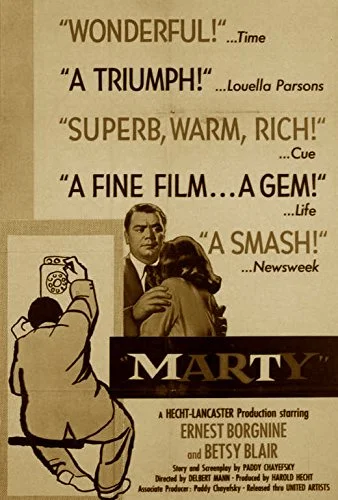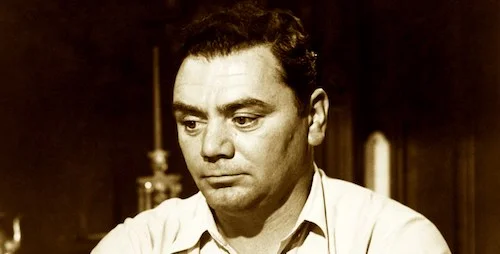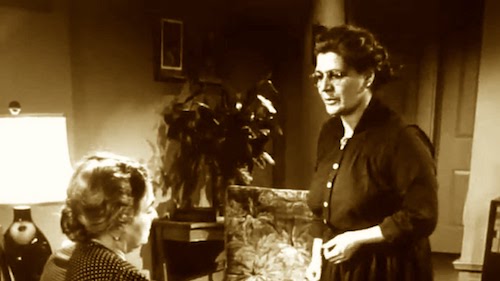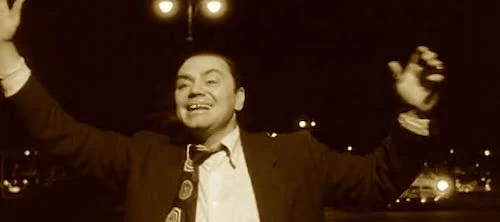Marty
This review is a part of the Best Picture Project: a review of every single Academy Award winner for the Best Picture category. Marty is the twenty eighth Best Picture winner at the 1955 Academy Awards.
At exactly an hour and a half in length, the shy drama Marty is the shortest Best Picture winner in history. That says a lot because I feel as though Marty can tell more in such a short amount of time, than a number of other Best Picture winners could in a number of hours. The poignancy is established by Delbert Mann's fixation with the small scaled side of a story, and Paddy Chayefsky's knack for extracting every drop of existential dread out of a source. Marty is tiny in stature, but massive in impact. Like its lead character, it is not to be misunderstood.
Marty's dismal form of self reflection attracted the attention of Cannes, and it became the second (and so far last) film to win both the Palme d'Or and Best Picture. Its yearning for positivity in a rough life is genuine optimism that feels fresh decades later. That's because nothing gets sugar coated. Even the 'Hollywood' ending is the chance of something good happening: not the shoving of a deus ex machina in your face to sell tickets. It's a celebration of the little wins in an unforgiving world. It's a universal mission.
Ernest Borgnine’s Marty leads a depressing lifestyle, which the actor presents richly.
Ernest Borgnine lives and breathes as the titular character: a lonely, well meaning gentle giant that lives at home and cannot make ends meet independently. He works as a butcher, and is often the reciever of the brunt end of customers. His life is represented by his job: everyone walks all over him, as he just minds his own business and accepts it. This is the star of the show. Think about it. How many films -- especially from this time period -- is actually thoughtful of citizens that simply can't catch a break? I don't mean down on their luck people that have a surprise event happen to them. I mean a Marty, whose entire day is now spent on one small glimmer of hope. This is some real substance.
His possible out comes in the form of Clara (played by Betsy Clair), who sees a brighter future ahead for Marty. His constricting mother (and his aunt) see this a dethroning event, and they must stop this relationship to allow Marty to continue being stymied for the rest of his life. He is destined to be a man child under his mother's roof. It's actually nonplussing that such a film could take a hold on many academies that year. It's almost assuring.
Marty introducing Clara, hoping that the interaction will go well.
Under any other director, Marty could have been a self pitying mess. With any other screenwriter, Marty could have been a stream of whines. No. This is an organically humanistic film that is guaranteed to touch you on a poetic level. It's a humbling experience within an often convoluted industry. People co plain about a lack of originality, and yet here is a breathtaking film that works with barely anything to make a point.
Marty’s mother and Aunt Catherine wallowing in enough toxic self despair to be negative influences on one another.
Marty makes mountains out of molehills, but that's its charm. He lives with a mother that blows everything out of proportion, so it only makes sense that his own plot line is dependent on conversations that other films would deam as menial. It's amazing what Chayefsky could wring out of nothing. When Marty's mother and aunt are talking in the dark behind his back, it feels like his kind of work he would do after (I'm thinking Network or The Americanization of Emily). It is viciously depressing for a film about an introvert finding love in the mid '50s.
Marty finally experiencing a bout of joy.
Marty is another slam dunk win by the Academy that seemed to do either very well or exceptionally poorly this decade. On the Waterfront makes more sense as a winner, given its stature and immediate impact. Marty is a wonderful winner. It's the kind of film that often gets overlooked by associations. It's good enough to get the attention of multiple. It's affirmation that cinema can speak about everyday battles if a storyteller is willing and bold enough to take on such a dare. Luckily I don't think many screenwriters cared less than Chayefsky, and Mann was fine with working with him at the time. Marty is as pure of a film as film can be.
Andreas Babiolakis has a Masters degree in Film and Photography Preservation and Collections management from Ryerson University, as well as a Bachelors degree in Cinema Studies from York University. His favourite times of year are the Criterion Collection flash sales and the annual Toronto International Film Festival.









